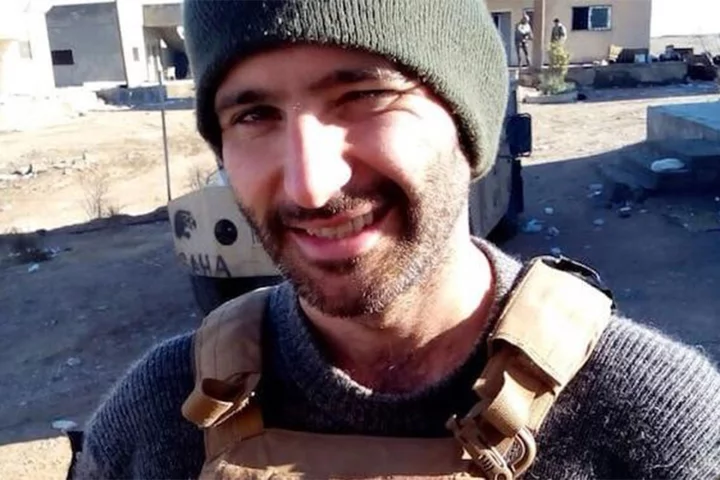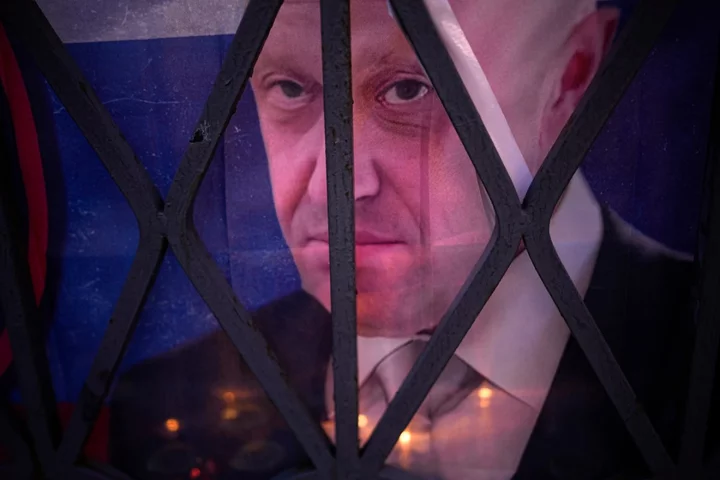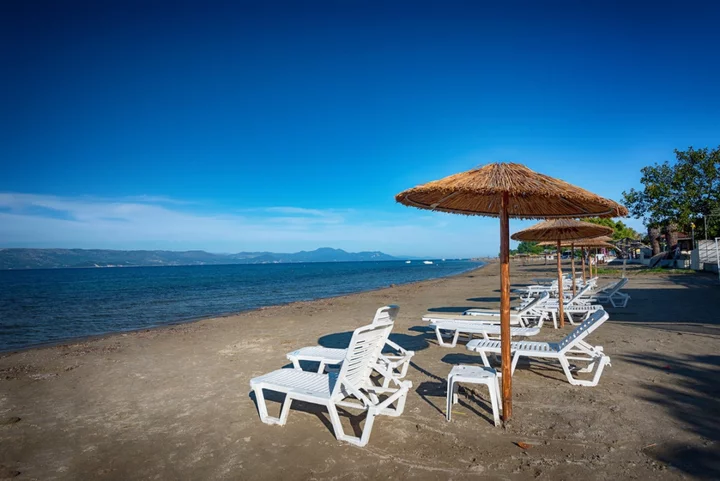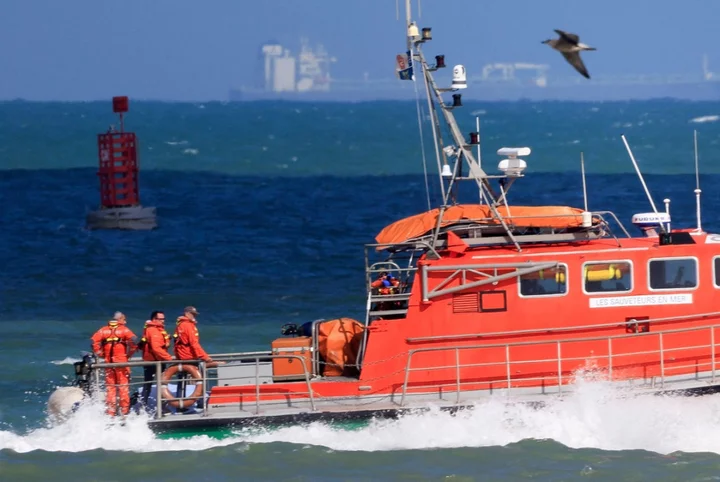
AI among biggest threats to next UK general election, cyber security agency warns
The rise of artificial intelligence (AI), as well aggressive state-aligned groups pose a significant threat to critical infrastructure, the UK’s cyber security agency has said. In its annual review, the National Cyber Security Centre (NCSC) warned ongoing geopolitical challenges and AI also posed a threat to UK elections. Published on Tuesday, the NCSC’s Annual Review said the Centre, which is part of GCHQ, had seen the emergence of a new type of cyber adversary in the last year – state-aligned actors who are ideologically, rather than financially, motivated. The NCSC highlighted China and Russia as enduring and significant threats to UK cyber security, noting that many of the new state-aligned groups it had seen appear were sympathetic to Russia’s invasion of Ukraine. On artificial intelligence, the NCSC warned that the next general election in the UK, expected next year, will be the first to take place against the backdrop of significant advances in AI, which it said would enable and enhance existing challenges. The cyber security agency said that large language models (LLMs) – the technology apps such as ChatGPT are built on – would almost certainly be used to generate fake content as part of disinformation campaigns to disrupt the democratic process. Beyond the present challenges, we are very aware of the threats on the horizon, including rapid advancements in tech and the growing market for cyber capabilities Lindy Cameron, NCSC At the first AI Safety Summit, held in the UK earlier this month, industry figures and world leaders warned of the potential for AI to help cybercriminals carry out more sophisticated cyber attacks. “The last year has seen a significant evolution in the cyber threat to the UK – not least because of Russia’s ongoing invasion of Ukraine but also from the availability and capability of emerging tech,” NCSC chief executive Lindy Cameron said. “As our annual review shows, the NCSC and our partners have supported government, the public and private sector, citizens, and organisations of all sizes across the UK to raise awareness of the cyber threats and improve our collective resilience. “Beyond the present challenges, we are very aware of the threats on the horizon, including rapid advancements in tech and the growing market for cyber capabilities. “We are committed to facing those head on and keeping the UK at the forefront of cyber security.” The annual review said work needed to be done to ensure the UK kept pace with the changing threats, particularly in relation to enhancing cyber resilience in the nation’s infrastructure. Read More Private parole hearing for one of killers of James Bulger to begin Papers react to Sunak’s reshuffle ‘gamble’ over return of Cameron Thunderstorm warning in effect as downpours continue in parts of UK Immigration minister Robert Jenrick vows to see Rwanda deportation plan through Cost-of-living payments not enough to meet scale of the problem, say MPs Applications open for owners to register XL bully dogs before ban
1970-01-01 08:00

Grant Shapps reveals military training plans inside Ukraine
Britain could deploy military instructors to Ukraine and even play a more active role in the Black Sea where Russia has targeted cargo ships, defence minister Grant Shapps has said. Mr Shapps – who took over the defence portfolio from Ben Wallace last month – said he has spoken with Army chiefs about the UK moving “more training” into Ukraine and stepping up defence production there. “I was talking today about eventually getting the training brought closer and actually into Ukraine as well,” he said in an interview with the Sunday Telegraph. “Particularly in the west of the country, I think the opportunity now is to bring more things in country, and not just training. We’re seeing BAE, for example, move into manufacturing in [the] country,” the defence secretary said. “I’m keen to see other British companies do their bit as well by doing the same thing.” The UK and its allies have till date steered clear of formal military presence inside Ukraine to prevent a direct conflict with Russia. The Russian invasion of Ukraine is now in its 20th month. The UK has trained more than 20,000 recruits from Ukraine since the start of 2022, but Nato members have avoided training programmes in the besieged country to avoid the risk of personnel being drawn into combat with Russia. Mr Shapps said he spoke to president Volodymyr Zelensky on Wednesday and hinted Britain could play a more active role in the Black Sea, where Russia has targeted cargo ships. “Britain is a naval nation so we can help and we can advise, particularly since the water is international water,” he said. “It’s important we don’t allow a situation to establish by default that somehow international shipping isn’t allowed in that water. There’s a lot of places where Britain can help advise,” he told the newspaper. This comes shortly after Mr Zelensky said he wants to turn his country’s defence industry into a “large military hub” by partnering with Western weapons manufacturers to increase arms supplies for its counteroffensive against Russia. One of Ukraine’s strongest allies against the continuing Russian invasion, London has spent £2.3bn on supporting Mr Zelensky’s war efforts between April 2022 and March 2023, according to former defence secretary Ben Wallace’s statement in July. Mr Wallace had said it put the UK only second to the US in terms of international donors of military aid to Ukraine, which is currently involved in counteroffensive skirmishes as it looks to retake its territory. “The delivery and provision of aid is dynamic and fast moving, responding to the priority needs of the armed forces of Ukraine,” he had said. He had also confirmed the success of British Storm Shadow cruise missiles in June and told the parliament that the weapons were already having a “significant impact on the battlefield”. Britain has already donated at least five million anti-personnel weapons, including mortars and grenades, along with 1,500 anti-air weapons and 100 launchers. The Ministry of Defence listed 12,000 ballistic vests and 80,000 helmets as having been supplied in July. A total of £4m had been spent on spare parts, tools and support kits for Kyiv’s military. Read More Ukraine aid left out of government funding package, raising questions about future US support Ukraine-Russia war - live: Moscow could annex more Ukrainian regions, says Medvedev ‘Keep an eye on Crimea’: Ukraine’s costly battlefield gains ‘prelude battle to retake peninsula’ Confident of Poland continuing Ukraine military support despite strained ties, Nato chief says Putin marks anniversary of annexation of Ukrainian regions as drones attack overnight
1970-01-01 08:00

Teenager’s death after drinking too much water was ‘preventable’
The death of a mentally ill teenager after he drank excessive amounts of water may have been prevented if his care and treatment had been delivered differently, an investigation has found. The 18-year-old was admitted out of hours to an adult mental health service inpatient unit in a health board neighbouring his own on 5 December 2018 as there were no local beds available – a move described in the report as a “high-risk action”. On the evening of 7 December, he suffered a seizure after drinking too much water and was transferred to intensive care. He died three days later from the consequences of water intoxication. The teenager, referred to as Mr D, had previous contact with Child and Adolescent Mental Health Services (CAMHS), where he had been treated after drinking an excessive quantity of water. He was diagnosed with early onset psychosis and received two years of community-based CAMHS care. An anonymised investigation by the Mental Welfare Commission for Scotland concluded there were “aspects of the care and treatment delivered by each health board which had it been conducted differently, might have prevented Mr D’s death”. The report, which made 10 recommendations, also said: “A more assertive approach to the treatment of Mr D’s psychotic illness in the two years before his death was warranted.” Mr D’s death came almost two years after he was first admitted as an emergency to an acute general hospital in January 2017 following a seizure due to water intoxication, aged 16. The seizure was induced by drinking large quantities of water, which he believed would remove toxins from his system. This affected his sodium metabolism (blood salts) with near fatal consequences. He later spent more time as an inpatient and turned 18 while still under the care of the CAMHS specialist psychosis service. The transfer of a very unwell young man with a complex clinical history to another health board area during the night was a high-risk action Suzanne McGuinness, Mental Welfare Commission The service was moving away from a treatment model that supported young people with first onset psychosis for at least three years from the point of diagnosis, towards one in which transition to adult mental health services began around the age of 18. He was admitted to a hospital in Scotland in December 2018 while detained under the Mental Health Act. The investigation also found that during the 70 hours after that admission to hospital, Mr D’s case records from his years of contact with the CAMHS community team were unavailable. The report said: “The failure to impart key clinical details to the treating ward staff during his final admission, both in the provision of all relevant case files and the creation of an informed and updated risk assessment and care plan, meant Mr D was able to engage in risky and ultimately fatal psychosis-driven behaviour without mitigations having been put in place.” The report makes recommendations for change to bodies including the health boards involved, the Royal College of Psychiatrists, NHS Education Scotland and the Scottish Government. They include that the Government should set standards within the next six months for the safe transfer to, or management of patients who present from other health boards. Suzanne McGuinness, executive director for social work at the Mental Welfare Commission, said: “This was a tragic death of a young man while he was being cared for in hospital. “Our report details the actions and decisions taken by teams at the two health boards involved in the lead-up to his death.” She said the risks associated with psychotic illness were “not coherently managed”. She added: “We also found that there were problems in Mr D’s transition from child and adolescent mental health services to adult mental health services. Existing guidance was not adhered to. “We found that although the service had no other viable option, the transfer of a very unwell young man with a complex clinical history to another health board area during the night was a high-risk action. “Mr D’s family told us they felt that they had not been listened to. They felt their concerns were not given due credence.” She urged mental health services across Scotland to read the report and take action where they believe they can make improvements. A Scottish Government spokesperson said: “The death of any person in care is not acceptable. “It is vital that people using our mental health services feel safe and know they will receive the right help, in the right place when they need it. “The relevant health boards and health and social care partnerships in this case have been issued with specific recommendations and learning points alongside general recommendations for all health boards and HSCPs. We expect the commission’s recommendations to be fully implemented. “The Mental Welfare Commission recommended that the Scottish Government set standards for the safe transfer of patients between health boards. “We will publish core mental health standards in the coming weeks to set clear expectations for transitions between and within mental health services.” Read More More parents letting children skip school and take term-time holidays post-Covid Student accused of fatally shooting UNC professor may be mentally unfit for trial Family of man who died while being admitted to psychiatric hospital agrees to $8.5M settlement Charity boss speaks out over ‘traumatic’ encounter with royal aide Ukraine war’s heaviest fight rages in east - follow live
1970-01-01 08:00

Body found in search for missing ex-British soldier fighting in Ukraine
A body has been found in the search for a former British soldier who went missing while fighting in Ukraine. Ex-paratrooper Daniel Burke, 36, of south Manchester, was reported missing by his family on 16 August after he had travelled to join the fighting in 2022. Greater Manchester Police said on Saturday that officers were working with Mr Burke’s family and the Ukrainian authorities to identify the body found and to bring him back to the UK. Mr Burke’s mother Diane Sniath told the BBC that “this is the moment I have been dreading”. His family told the broadcaster that the body was found in Zaporizhzhia, which lies about 27 miles from the front line. Detective Superintendent Lewis Hughes who is GMP’s Lead for Disaster Victim Identification said: “This is an upsetting time for Daniel’s family, we have family liaison officers in contact with the family and offering support. “My team and I are working with the Ukrainian authorities to make formal identification with a view to repatriating Daniel following that process. “Daniel’s family have asked for privacy at this difficult time.” Mr Burke, who previously served with the Parachute Regiment, told the BBC on 6 August that he planned to join a Ukrainian army unit to fight against Russian forces. In 2019 he spent eight months in prison accused of terror offences after going to Syria to fight with Kurdish militia against the Islamic State group. All the charges against him were dropped in 2020, the BBC reported. At least 10 other British men have died in Ukraine since the Russian invasion began last February, according to the Foreign Office. Last week, tributes were paid to former Scots guard Jordan Chadwick, 31, from Burnley, who left the UK to travel to the country in early October 2022 to “support freedom”. And in August, Sam Newey, 22, died while serving on the front line in Eastern Ukraine on Wednesday, according to his brother, who said he was “proud” of his sibling. Read More Ukraine-Russia war – live: Putin’s forces suffer ‘significant losses’ as Kyiv vows more drone strikes Kim Jong-un shown Russia’s nuclear capable bombers and hypersonic missiles UK officially bans Russia’s Wagner paramilitary group as terrorist organisation Unesco adds two locations in war-ravaged Ukraine on its list of historic sites in danger American XL Bullies amnesty to come before ban as breed ‘linked to half of attacks’ How will American XL bully ban work and what happens if you own one? Russell Brand denies ‘very serious allegations’ related to ‘promiscuous’ past
1970-01-01 08:00

UK officially bans Russia’s Wagner paramilitary group as terrorist organisation
The UK has formally banned Russia's mercenary Wagner Group as a terrorist organisation weeks after the death of its leader Yevgeny Prigozhin. The government order, approved on Friday, makes it a criminal offence to be a member or a supporter of the paramilitary group in the UK. “The Russian mercenary organisation, Wagner Group, has been proscribed as a terrorist organisation today after an order was laid in Parliament on Wednesday September 6,” the Home Office said in a statement. Apart from joining the group or showing support, arranging meetings for the group and displacing Wagner's flag or logo will also be considered a criminal offence. Those found guilty of violating the order will face a potential prison sentence of up to 14 years, which can be handed down alongside or in place of a fine, it added. The move puts Wagner in the same category as the Islamic State group, the Palestinian militant group Hamas, Boko Haram in Africa and Northern Ireland paramilitaries among others. The Wagner Group is a private military company that was under the control of Prigozhin until his reported death in a plane crash on 23 August. It has been a key part of Moscow’s fighting force in Russia's invasion of Ukraine. Home secretary Suella Braverman proposing the ban last week said Wagner has been "involved in looting, torture and barbarous murders". Calling the group a "threat to national security", Ms Braverman added:"They are terrorists, plain and simple - and this proscription order makes that clear in UK law." The ban will allow UK authorities to seize the organisation’s assets in a symbolic move as Wagner is not known to operate in Britain. Wagner cut its teeth in deployments to Crimea – illegally annexed by Russia in 2014 – and eastern Ukraine’s Donbas region in the aftermath of that act and has since dispatched troops to several conflicts in the Middle East and Africa, including the Syrian Civil War. The ban came into force following a recommendation by the parliament’s influential Foreign Affairs Committee in July that Wagner be outlawed. The committee said British authorities had “underplayed and underestimated” the threat posed by the mercenary group. The committee said Wagner’s future was uncertain after Prigozhin’s short-lived armed mutiny against Russia’s top military leaders in June. The lawmakers said Britain should take advantage of the confused situation to “disrupt” Wagner. Several other allies of Ukraine have sanctioned Wagner's leaders, and earlier this year, the Lithuanian and Estonian legislatures passed resolutions declaring it a terrorist organisation. The US has designated the Wagner Group as a transnational criminal organisation. Read More With its leader dead, can the Wagner group rise and ride again? What next for the Wagner Group as leader presumed dead in plane crash? Ukraine-Russia war – live: ‘Significant losses’ for Putin’s forces as Kyiv retakes village and attacks ships The Body in the Woods | An Independent TV Original Documentary The harrowing discovery at centre of The Independent’s new documentary
1970-01-01 08:00

Groundbreaking migraine treatment offers ‘new hope’ for patients
A treatment for acute migraines has been approved for NHS use for the first time, with experts saying the move could be a “step-change” for thousands of people who suffer from the condition. The National Institute for Health and Care Excellence (Nice) said its final draft guidance on Rimegepant “addresses the high unmet need for treatment options for acute migraine”. Rimegepant, also known as Vydura and made by Pfizer, will be available to adults who have tried at least two triptans – medication usually given to tackle headaches or migraines – but found they did not work well enough. It can also be administered to those who are not able to take triptans or have an intolerance, or patients who have tried nonsteroidal anti-inflammatory drugs (NSAIDs) and paracetamol. Helen Knight, director of medicines evaluation at Nice, said: “Migraine is a condition described in comments to Nice from carers and people with migraine as an invisible disability that affects all aspects of life including work, education, finances, mental health, social activities and family. “Today’s final draft guidance addresses the high unmet need for treatment options for acute migraine, once again demonstrating our ability to ensure clinically and cost-effective medicines are available to those who need them as quickly as possible.” Rimegepant is taken as a wafer, which dissolves under the tongue and works by stopping the release of a protein around the brain called calcitonin gene-related peptide. In July, the medicine was recommended as an option for preventing episodic migraines in adults who have at least four and fewer than 15 attacks per month if “at least” three other treatments have not worked. This is the first and only Nice-recommended medicine that can help alleviate the misery of acute migraines, and may be considered a step-change in treatment Helen Knight, Nice Under the latest guidance, it will also be used to relieve symptoms of a migraine, which can include pain, nausea and sensitivity to light, but also painless symptoms such as temporary visual disturbances known as “aura”, which Nice said “is not well managed with existing treatments”. The recommendation is expected to benefit about 13,000 people. Ms Knight added: “This is the first and only Nice-recommended medicine that can help alleviate the misery of acute migraines, and may be considered a step-change in treatment.” Migraine is an incredibly misunderstood condition that can have a significant impact on all areas of life, including ability to work, maintain relationships and mental health Robert Music, The Migraine Trust Robert Music, chief executive of The Migraine Trust, said the Nice guidance “provides people with migraine valuable options to help reduce the pain and length of a migraine attack”. “It brings new hope,” he added. “It will especially benefit those who have not found a treatment that works, those who get debilitating side effects – including medicine overuse headache – from them, and those with cardiovascular disease who cannot take existing treatments. “Migraine is an incredibly misunderstood condition that can have a significant impact on all areas of life, including ability to work, maintain relationships and mental health.” Read More NHS winter resilience fund announced by Government NHS reliance on paper notes ‘stopping trusts from realising full potential’ Recession fears as UK economy shrinks by more than expected in shock decline Charity boss speaks out over ‘traumatic’ encounter with royal aide Ukraine war’s heaviest fight rages in east - follow live
1970-01-01 08:00

‘Get back in the kitchen’: Lioness Fara Williams on the aggressive sexist and homophobic abuse she gets online
Former England footballer Fara Williams has spoken out about the sexist and homophobic abuse she has suffered online, saying she’s been told to “get back in the kitchen”. In an exclusive interview with The Independent, the ex-midfielder turned football pundit said trolls question her knowledge of the sport, telling her she knows “nothing about the game”. The 39-year-old, who is England’s most capped player, said the online abuse is “definitely sexist” and gets worse and is “more aggressive” when she is reporting on men’s football rather than the women’s game. “When I’m doing punditry in a women’s game, the percentages in terms of the abuse you get is really, really minimal compared to when as a female, I talk on the men’s game as a pundit,” Williams said. “The abuse heightens and it’s more aggressive, more direct. Definitely more abusive.” The football commentator said she thought “jealousy” was “probably one of the main things” which drives people to perpetrate online abuse. She said many people think trolls are people who you are “really close to”, adding: “You get trolled by people that you think are your friends and they are the ones that know the most about you.” The former Lioness said she is able to cope with the online hate because she has a “thick skin”, but her ability to handle abuse could potentially change if the harassment were to ramp up. The “daily” abuse suffered by footballers she used to play with who are now prominent in the media is “not acceptable”, she stated. Ms Williams added: “I’ve seen a change in them as people because of social media – close friends that have really been affected by some of the awful abuse that they get online.” She said: “If you are bombarded with abuse daily, at some point it will affect your mental health, whether you think you are strong headed or not.” Ms Williams said: “As I said, I’m quite strong headed now, but there is nothing to say that if I was to be absolutely bombarded with abuse on a daily basis, that couldn’t change how I start to think and see myself.” Her friends are targeted with “horrific abuse” for simply “having an opinion in a workplace that they are supposed to have an opinion in”, she added. Discussing homophobic online abuse, she said: “I’m sure they’re aware that there are a lot of gay people within the women’s game, and it’s easy for them to drop a comment in.” Ms Williams, a member of Hope United, a team of footballers committed to tackling online sexist hate, reflected on whether the abuse she endures would worsen if her punditry for men’s football ramps up. "They could talk about the way I talk, the way I look, the way I sound,” she added. “Who I think I am.” Ms Williams said she hoped abuse on social media would improve when the online safety bill is rolled out as a change in the law would make people “accountable” for their comments. The legislation, which aims to tackle hate speech, cyberbullying, and disinformation, is in its final stages in parliament and would see social media companies also held accountable for abuse published on their sites. The ex-footballer attended a roundtable meeting at 10 Downing Street on Tuesday to demonstrate her backing for proposed changes to the online safety bill, which would boost the online protection of women and girls. “For me, social media has become a fantasy world where you can do whatever you want and get away with it without any consequences,” Ms Williams said. Turning her attention to the World Cup kiss saga, she said it was “disappointing” that it “took so long” to be dealt with. Her comments come after the president of the Royal Spanish Football Federation Luis Rubiales has come under sustained criticism for kissing player Jenni Hermoso on the lips after Spain secured their 1-0 win over England last month. Rubiales, who was also condemned for grabbing his crotch after Spain won the women’s world title for the first time in history, refused to step down over his behaviour but was suspended by Fifa. He eventually resigned as president on Sunday, after weeks of pressure, after Hermoso filed a legal complaint. Jorge Vilda, head coach of Spain’s women’s team, was fired last week after he was among those who praised Rubiales’ refusal to step down. “It’s the only thing that’s been spoken about when Spain were phenomenal in the World Cup and these women should be celebrated,” she added. “For me, it’s a celebration of their success and I think that’s been forgotten and the girls probably haven’t been able to celebrate.” Discussing Rubiales, she said: “I think the right thing has been done now. He stepped away from it. He still hasn’t apologised.” Read More Fara Williams: England’s most-capped footballer announces retirement England winning Euro 2022 ‘a real proud moment’ for ex-midfielder Fara Williams Jill Scott says World Cup kiss saga ‘overshadowed’ Spanish women’s team playing ‘great football’ Lioness Demi Stokes says misogynistic abuse online ‘really affected’ England players’ game ‘History in the making’: Lionesses’ Euros success sparks booming interest in women’s football Women’s sport is bigger and better than ever in 2023 – rundown of the best in the calendar
1970-01-01 08:00

UK to declare Wagner Group a terrorist organisation
Russian mercenary group Wagner will be declared a terrorist organisation and a draft order against the private militia will be laid in parliament on Wednesday, the Home Office said. Once cleared, the order will make it illegal to be a member of the group or to support it. The group, formerly led by now-dead Yevgeny Prigozhin, is known to carry out Russia’s dirty work in Syria and Africa, and has also handed Vladimir Putin Russia’s biggest victory of capturing Bakhmut against Ukraine in the continuing invasion. Assets belonging to Wagner, primarily consisting of contractors and prison convicts, will be declared as terrorist property and will be seized after the draft order is cleared. It will also render certain proscription offences punishable by up to 14 years in jail. Home secretary Suella Braverman called the group a “violent and destructive organisation which has acted as a military tool of Vladimir Putin’s Russia overseas”. “While Putin’s regime decides what to do with the monster it created, Wagner’s continuing destabilising activities only continue to serve the Kremlin’s political goals,” she said in a statement. “They are terrorists, plain and simple – and this proscription order makes that clear in UK law. Wagner has been involved in looting, torture and barbarous murders. Its operations in Ukraine, the Middle East and Africa are a threat to global security,” the home secretary said. “That is why we are proscribing this terrorist organisation and continuing to aid Ukraine wherever we can in its fight against Russia.” Once declared illegal, Wagner will join other organisations on the proscribed list like the Islamic State, al-Qaida and neo-Nazi group National Action. The Home Office said proscription of the group comes after consideration of the nature and scale of the organisation’s activities as well as the threat they pose to British nationals abroad. In May this year, a government source said the move to declare the group illegal was “imminent” and the administration was working on building a legal case. The push came after a government department reportedly helped its millionaire owner Prigozhin to circumvent UK sanctions to take a British journalist to court in 2021. The Treasury commissioned an internal review of its processes after it was reported that licences had been issued to allow lawyers to help Prigozhin launch legal action against a reporter of investigative website Bellingcat in the UK while the Russian oligarch was subjected to sanctions. As a result of the review, the department said the government was committed to “further targeted changes to the process for issuing legal fees licences that safeguard the sanctions regime against the risk of manipulation and ensure ministers are accountable for OFSI Office of Financial Sanctions Implementation) decision-making”. Wagner’s fate as Russia’s trusted brutal force in private capacity has been hanging by a thread after its leader Prigozhin was killed in a plane crash last month. The crash occurred exactly two months after Prigozhin mounted a short-lived armed rebellion against Russia’s military leadership, posing the biggest challenge to Mr Putin’s authority in his 23-year rule. Read More With its leader dead, can the Wagner group rise and ride again? Russians are convinced Wagner warlord Prigozhin is still alive as conspiracy spreads that Putin killed body double Kremlin says 'Deliberate wrongdoing' among possible causes of plane crash that killed Prigozhin The Kremlin says Putin is not planning to attend Wagner chief Prigozhin's burial White House says Kremlin has ‘long history’ of killing its opponents following Prigozhin death
1970-01-01 08:00

Jill Scott says World Cup kiss saga ‘overshadowed’ Spanish women’s team playing ‘great football’
Euro 2022 winner Jill Scott has voiced “disappointment” that the World Cup kiss saga has detracted attention from the Spanish women’s team win. The former England midfielder told The Independent that issues within Spanish football have “overshadowed” the team’s “great football”. Her comments come after the president of the Royal Spanish Football Federation Luis Rubiales has come under sustained criticism for kissing player Jenni Hermoso on the lips after Spain secured their 1-0 win over England last month. Rubiales, who was also condemned for grabbing his crotch after Spain won the women’s world title for the first time in history, has refused to step down over his behaviour but was suspended by Fifa. It comes as Jorge Vilda, head coach of Spain's women’s team, was fired on Tuesday after he was among those who praised Rubiales’ refusal to step down. Scott said she felt “disappointment” that the kiss has been “the main talking point”, rather than Spain actually winning the World Cup. “I know that there were girls that decided not to go to the World Cup because they weren’t happy with the way things were going. And that for me is just so sad to hear because it’s a dream to play in a World Cup. “I was so fortunate that I got to do that four times, and it’s something that you dream of from being a young girl, and to think that was taken away from them. First and foremost, that is sad.” Speaking to The Independent in a wide-ranging interview, the Lioness also discussed the bullying she endured as a young girl playing football at school. She said people often thought she was a boy because she played football and questioned how girls could play the game. The 36-year-old said it was “unusual” to see girls playing football back then and said she sometimes suffered worse bullying from parents rather than her classmates. “Sometimes for parents, if a young girl back then – I’m going back 30 years – beat their son, it was a bit of an embarrassment,” she added. Scott said she would attend football camps where she was the one girl alongside 50 boys, as well as going to football tournaments where she was the only girl. The former footballer said even though she was better at football than some of the boys she “never wanted special treatment for being a girl”. Scott added: “I just wanted to play football and as a young kid, I didn't understand why it was such an issue that I just wanted to play football.” She continued: “Once I stepped over that white line, that was where I wanted to be. I could escape everything.” Her comments come as new research by Starling Bank found three in 10 girls stop playing football when they get to their late teenage years – a far higher proportion than the one in ten boys who give up the sport. Researchers, who polled 2,000 11 to 16-year-olds in the UK, found that over a quarter of girls quit football over pressures to perform well at school. Meanwhile, 14 per cent stop playing because of insecurities about their body image and eight per cent bow out of football for being bullied for playing the game. Scott, who is an ambassador for the bank, said social media pressure was partly to blame as it puts pressure on girls to make them feel like they should look a particular way. “It’s kind of this perfect world isn't it, in a sense,” she reflected. “And I think we're all guilty of doing it. We don't want to post a picture unless you look good or if it’s filtered.” Scott explained she has coached football to girls aged between 13 and 15 and you can see they do not want to get “stuck into a tackle” or do not “want to get sweaty” due to anxiety about how they will look. Read More Spanish FA chief blames player for World Cup kiss and shouts ‘I am not resigning!’ in chaotic press conference Spanish soccer federation fires women's national team coach Jorge Vilda amid Rubiales controversy ‘He wasn’t raping her’: Woody Allen offers staggering defence of Spanish football boss Luis Rubiales ‘History in the making’: Lionesses’ Euros success sparks booming interest in women’s football Lioness Demi Stokes says misogynistic abuse online ‘really affected’ England players’ game
1970-01-01 08:00

British policewoman, 22, dies ‘falling’ on Corfu holiday
A female police officer has died while on holiday on the Greek island of Corfu. The 22-year-old has not been named but was a serving officer with Surrey Police, and is believed to have been killed in an “accidental fall”. Greek authorities believe the fatal injuries she sustained are compatible with a “low level accidental fall”, the Mirror reports. The Greek town has long been a favourite amongst British tourists. A Surrey Police spokesperson said: “On Friday, 1st September we were sadly made aware of the sudden death of a serving officer whilst they were on holiday in Corfu, Greece. Have you been affected by this incident? If so, email holly.evans@independent.co.uk “We are working to support both their family and their colleagues here during this extremely difficult time. “An investigation into the circumstances of the death is being led by the Greek authorities and we await further updates from them as they conduct their enquiries.” In a statement online, the Surrey Police Federation added: “Devastating news with the confirmation that a 22-year-old Surrey Police officer has died off duty on holiday in Greece. “The officer’s name has not been released and the circumstances into her death on Friday are being investigated. “The thoughts of all at Surrey Police Federation are with the officer’s family, friends and close colleagues at this time. “Both the Federation and the force are supporting them.” More follows on this breaking news story Read More Police must have ‘zero tolerance’ policy to shoplifting Girl, 3, mauled in ‘horrific’ dog attack outside pub suffers serious face injuries as man arrested Fundraising appeal for funeral of toddler hit by vehicle tops £16,000 Fugitive stepmother of girl found dead at home should return to UK, says cousin Man charged in connection with break-in at Chelsea star Raheem Sterling’s home Sara Sharif’s grandfather urges fugitive son to hand himself in
1970-01-01 08:00

British tourist drowns jumping into lake to cool off during family holiday to Turkey
A British tourist, aged 43, has reportedly drowned after he jumped into a lake to cool off during a family holiday to Turkey. The man was part of an organised tour at the Manavgat Dam in Antalya, when he dove into the water for respite from the 33C summer, according to news reports. A spokesperson for the Foreign, Commonwealth & Development Office confirmed a British man had died in Turkey and that it was “in touch with local authorities” in a statement. He reportedly entered the water from a pier platform connected to a riverside restaurant. Shortly after, he appeared to struggle and reportedly made desperate attempts to stay afloat. Local media reported that while some onlookers rushed to help the man, others alerted authorities about the incidents. Officers from Turkey’s Gendarmerie General Command, rescue divers and emergency service providers responded to the scene. Divers reportedly retreived the man’s lifeless body from around 40ft beneath the water’s surface. Medical staff reportedly waiting on dry land pronounced the man dead, as his body was sent to the Antalya Forensic Medicine Institute for a post-mortem examination. It is currently not clear why the man drowned, and it is hoped the autopsy will provide more details into the tragic incident. A spokesperson for the Foreign Office told the Evening Standard: “We are supporting the family of a British man who has died in Turkey, and are in touch with local authorities.” Antalya, known for its blue waters and stunning coastline, is a popular Turkish holiday destination that accounts for around 30 per cent of the country’s foreign visitors. Last month, temperatures in Antalya touched 44C as a heatwave swept across many European countries, including Spain, Greece, and Italy. Read More Lucy Letby news – latest: Whistleblower hits out at NHS failings after concerns about killer nurse ignored Pakistani rescuers try to free 6 children and 2 men from a cable car hundreds of feet in the air Eighteen bodies found in Greek forest hit by fire believed to be migrants Turkey says UN lost neutrality after world body condemns Cyprus roadwork, assault on peacekeepers Major wildfires burn in Greece, Spain's Canary Island of Tenerife A bus crashes off the road in central Turkey, leaving 12 passengers dead
1970-01-01 08:00

Teen survivor of migrant boat sinking among four arrested over disaster in English Channel
A teenage boy who survived a migrant boat sinking that left at least six people dead in the English Channel has been arrested has part of a probe into the incident. The Sudanese boy, aged 16 or 17, was rescued and taken back to France after the boat suffered engine damage and capsized. He is suspected of “activiely participating” in the crossing in exchange for reduced rate for his own passage to Britain, according to French authorities. He is among four people being detained as part of an investigation into the incident, with alleged offences including manslaughter and criminal association. The probe was announced as official figures showed another 444 people arrived in small boats on Wednesday, pushing the total for this year over 17,000. A pregnant woman and young children were among those rescued, as crossings surged just days after Saturday’s disaster. The teenager and another Sudanese man in his 20s were among 38 survivors who were taken to safety in France following the sinking. Twenty-three more were rescued and brought ashore in the UK. At least six people, thought to be Afghan refugees, died. Authorities fear other victims may have drowned but remain missing at sea. Two Iraqi men who were allegedly part of the smuggling network that organised the crossing have also been detained on French soil. The specialist Junalco organised crime unit, which leads major people smuggling investigations in France, said the sinking happened around 12 miles from the French coast on the night of 11 to 12 August. “Investigations at this stage have made it possible to establish that the makeshift boat had suffered engine damage and had torn at sea, when most of the passengers did not have life jackets,” a spokesperson said. “Almost all of [those on board] were of Afghan nationality and had passed through the ‘Jungle’ camp in Calais, before setting off from a beach further from the town.” A passing commercial ship saw the dinghy sinking and called the emergency services at around 4.20am local time (3.20am BST), authorities said, and several nearby ships were diverted to the area. A Navy tugboat, French rescue crew, two British rescue boats and helicopter were deployed to locate the boat, but several people were already in the water. One person was declared dead after being pulled from the sea and evacuated by helicopter to a hospital in Calais, while another five bodies were recovered. Searches continued into Saturday afternoon but no other people were found, and survivors’ accounts suggested others may have boarded the vessel in France. Junalco said it had made a request to British law enforcement for assistance with its ongoing investigation, following interviews of survivors in the UK. More than 50 people are thought to have drowned attempting to cross the Channel since 2018, while others have lost their lives attempting to board lorries and trains in France, or walk through the Channel Tunnel. On 10 August, several people were rescued from a sinking dinghy that had reached British waters. The RNLI said it pulled several people from the water but believed everyone was accounted for. The previous day, French authorities reported six children suffering from hypothermia had been taken to hospital after their boat went down off the coast near Sangatte. More than 17,200 people have crossed the English Channel in small boats so far this year, around 15 per cent down on the over 20,000 seen by the same point in 2022. Weeks of unseasonably windy weather and rough seas had suppressed crossings, but high numbers are expected if calm and fine conditions continue in the coming days. Prime minister Rishi Sunak has made “stopping the boats” one of his top five priorities ahead of the next general election, but government attempts to deter crossings have so far failed amid a lack of alternative safe and legal routes for asylum seekers. Afghans are now the most common nationality making the journey, following the collapse of resettlement schemes after the 2021 Taliban takeover. There has been an increase in Sudanese asylum seekers after conflict broke out earlier this year, and the government refused to set up a route for people fleeing the country. Read More Six dead and dozens rescued after migrant boat capsizes in Channel as search continues Sudanese refugees face deportation from UK as government fails to set up safe and legal routes Bibby Stockholm migrants won’t be back on barge ‘for weeks’ after Legionella scare Small boat arrivals continue as Channel crossings set to top 17,000 Ministers urged not to ‘abandon’ Afghans on anniversary of Taliban takeover Minister vows to make Afghan resettlement schemes ‘work properly’
1970-01-01 08:00
